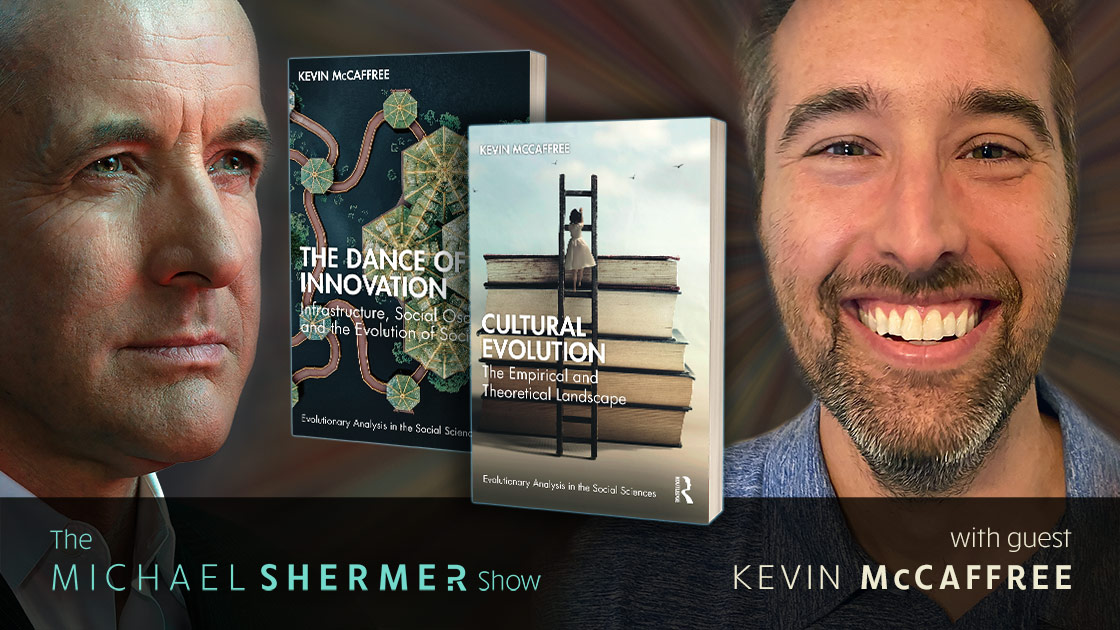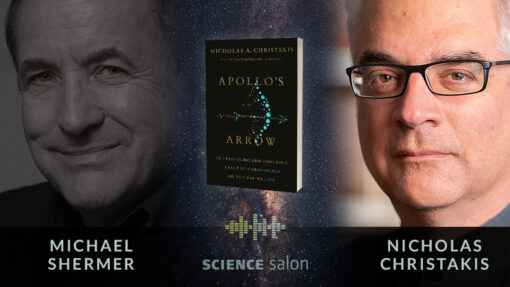sociology

Since the dawn of social science, theorists have debated how and why societies appear to change, develop and evolve. Shermer speaks with sociologist Kevin McCaffree about: his research on crime and gun violence • diversity, equity, and inclusion • political polarization •cultural and biological evolution • horizontal/equalitarian vs. vertical/hierarchical societies • human selfishness and the problem of altruism, and what the future holds for humanity and society…

Shermer and Christakis discuss: the replication crisis in social science and medicine • determining causality: how we know smoking causes cancer and HIV causes AIDS, but vaccines do not cause autism and cell phones do not cause cancer • randomized controlled trials and why they can’t be done to answer many medical questions • natural experiments and the comparative method of testing hypotheses (e.g., comparing different countries differing responses to Covid-19) • the hindsight bias and the curse of knowledge…

The recent spate of drone sightings in the Midwest have residents on edge. Medical sociologist Robert Bartholomew avers that one explanation can be ruled out — mass hysteria.
In Science Salon # 102 Michael Shermer speaks with Christopher Ryan about his new book: Civilized to Death: The Price of Progress. PLUS, The recent spate of drone sightings in the Midwest have residents on edge. Medical sociologist Robert Bartholomew avers that one explanation can be ruled out — mass hysteria.
In this week’s eSkeptic, Anondah Saide reviews the book Paranormal America: Ghost Encounters, UFO Sightings, Bigfoot Hunts, and Other Curiosities in Religion and Culture by Christopher D. Bader, F. Carson Mencken, and Joseph O. Baker.
One of the most difficult problems in the social sciences is understanding why some people intentionally inflict emotional and physical pain on others. Such intentional pain occurs not only on a local level — within families, with “friends,” or in work situations, but also on a national and international scale — Hitler’s Holocaust, Stalin’s purges, and Chairman Mao’s slaughter of millions. Neuroscience is providing the potential for a revolution in our understanding of why “bad” people do what they do…
The term “witch-hunt” is used today to describe everything from political scandals to school board shake-ups. Long before the Salem witch trials, women and men were rounded up by neighbors, accused of committing horrific crimes using supernatural powers, scrutinized by priests and juries, and promptly executed. The belief in witchcraft — and the deep fear of evil it instilled in communities — led to a cycle of accusation, anger, and purging that has occurred repeatedly in the West for centuries…
In this debate, on what are arguably two of the most important questions in the culture wars today — Is Religion a Force for Good or Evil? and Can you be Good without God? — the conservative Christian author and cultural scholar Dinesh D’Souza and the libertarian skeptic writer and social scientist Michael Shermer, square off to resolve these and related issues, such as the relationship between science and religion and the nature and existence of God.
Why do people dodge responsibility when things fall apart? Why the parade of public figures unable to own up when they screw up? Why the endless marital quarrels over who is right? Why can we see hypocrisy in others but not in ourselves? Are we all liars? Or do we really believe the stories we tell? Renowned social psychologist Dr. Carol Tavris takes a compelling look into how the brain is wired for self-justification…
How is it possible for ordinary, average, even good people to become perpetrators of evil? Dr. Zimbardo, Professor of Psychology at Stanford University, ran the famous “Stanford Prison Experiment” in the late 1960s that randomly assigned healthy, normal intelligent college students to play the roles of prisoner or guard in a projected 2 week-long study that he was forced to terminate after only 6 days because it went out of control, with pacifists becoming sadistic guards, and normal kids breaking…
The question of how and when the world will end has captivated thinkers for centuries. Wars, natural disasters, social upheaval and personal suffering often send believers back to the writings of their prophets and seers, whose gift is to bring satisfying answers to such questions. Kirsch takes us on a delightful 2,000-year journey and shows how churches, philosophers, clergy and armchair interpreters have promoted their political, social and religious agendas based on their belief that the end was imminent…
Dr. Nancy Segal, a leading expert on twins, goes deep into the stories behind her research to reveal the real-life dilemmas and joys of twelve remarkable sets of twins, triplets, and quadruplets.
In this week’s eSkeptic, Michael Shermer reviews Blink: The Power of Thinking Without Thinking by Malcolm Gladwell.
Why were Prometheus and Loki envisioned as chained to rocks? What was the Golden Calf? Why are mirrors believed to carry bad luck? How could anyone think that mortals like Perseus, Beowulf, and St. George actually fought dragons, since dragons don’t exist? Strange though they sound, however, these “myths” did not begin as fiction…











